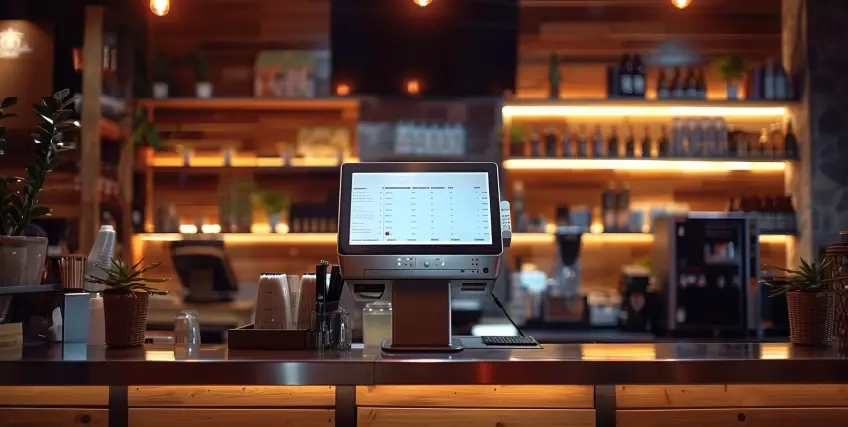Cook Up Growth with Hassle-Free
Business Funding for Restaurants!
Explore restaurant loans and financing from Biz2Credit designed to meet your restaurant’s needs.
Looking for Business Financing?
Apply now for flexible business financing. Biz2Credit offers term loans, revenue-based financing, lines of credit, and commercial real estate loans to qualified businesses.
Set up a Biz2Credit account and apply for business financing.
Understanding the Unique Financial Needs of Restaurants
The restaurant industry is ever evolving, with new trends, customer preferences, and economic factors constantly reshaping the business environment. Whether you own a cozy café, a trendy bar, or a fine-dining restaurant, managing your finances effectively is crucial. High overhead costs, fluctuating revenues, and the need for constant reinvestment in staff, marketing, and equipment are just a few of the daily challenges restaurant owners face. Securing reliable restaurant loans or business funding for restaurants can be a game changer, helping entrepreneurs thrive in a competitive space. But as many restaurateurs discover, getting the right restaurant financing you need can be more difficult than you expect. That’s where Biz2Credit can help.
Why Biz2Credit Stands Out as a Top Choice for Restaurant Loans?
Biz2Credit stands out as a preferred platform for restaurant owners to find restaurant loans and financing because we know what restaurateurs need. We understand the unique financial challenges faced by restaurant owners, from seasonal cash flow changes to the constant need to reinvest in equipment and staff. That’s why we offer small business loans for restaurants through our customized financing products, which can be used to purchase equipment and other essentials to help you meet your business’s most important needs.
Our fast, simple online application process ensures that you don’t waste time jumping through hoops. With Biz2Credit, you get quick funding decisions, competitive pricing, and flexible repayment plans, allowing you to focus on running and growing your business. We also provide dedicated customer support to guide you every step of the way, making us the trusted choice for business funding for restaurants. Restaurant owners across America trust Biz2Credit for reliable restaurant financing—join them today!
Our Strengths:
- Repayment Simplicity: We have simple repayment options for restaurant loans and other financing with flexible repayment terms. See your payment schedule and make payments any time in your Biz2Credit account.
- Dedicated Funding Specialists: Consult a funding specialist to determine what financing options fit your business best or get help at any time along the way as you complete our online funding application.
How Small Business Loans for Restaurants Can Help You Grow
Running a successful restaurant requires more than just great recipes and customer service. It involves managing high operational costs, keeping up with the latest industry trends, and maintaining cash flow to cover day-to-day expenses. That’s where restaurant loans come in. Whether you need funding to renovate your dining area, upgrade kitchen appliances, or hire additional staff, restaurant-specific financing can give your business the boost it needs to thrive. There are a variety of restaurant loans available in the market such as SBA loans, equipment financing for restaurants, and more that can help a restaurant flourish in this competitive market.
Biz2Credit offers financing options, including term loans for restaurants that can be used for various purposes such as kitchen equipment financing. These financing are designed to meet the diverse needs of restaurant owners, from upgrading to expansion. With flexible repayment terms and quick funding, Biz2Credit makes it easier for you to focus on what matters most - delighting your customers and growing your business.
Explore Restaurant Financing Designed for Your Business Needs
01 Term Loans for Restaurants
Term loans are one of the most common and reliable financing options for restaurant owners. These types of restaurant loans provide a lump sum upfront, which is repaid over a fixed period with set interest rates. Whether you're planning to renovate your dining space, expand to a new location, or invest in marketing campaigns, a term loan offers the stability and predictability you need to execute long-term projects. Compared to other financing platforms, Biz2Credit provides small business loans for restaurants with convenient repayment terms and competitive interest rates.
This option is ideal for restaurant owners who are ready to scale their business by investing in their long-term growth. With Biz2Credit’s fast and simple application process, you can focus on expanding your footprint with Biz2Credit financing at your back.
Eligibility Criteria:
- Minimum 18 months in business
- Annual revenue of $250,000 or more
- A credit score of 650 and above
02 Revenue-Based Financing for Restaurants
Revenue-Based Financing is a flexible funding option that aligns repayments with your restaurant’s cash flow. Unlike traditional loans with fixed monthly payments, revenue-based financing calculates payments as a percentage of estimated future receivables. This option is particularly useful for restaurants that experience fluctuations in sales. But keep in mind that revenue-based financing is not a loan.
With Biz2Credit’s revenue-based financing, restaurant owners can quickly free up working capital and cover expenses like purchasing inventory or hiring seasonal staff. Since repayments are tied to revenue, it reduces the financial strain during off-peak periods. This option ensures that your repayment schedule remains manageable, giving you the flexibility to grow your business without worrying about cash flow disruptions.
Eligibility Criteria:
- A credit score of 575 and above
- Minimum of 12 months in operation
- Annual revenue of $250,000 or more
03 Commercial Real Estate Loans for Restaurants
If you’re planning to buy or renovate a property for your restaurant, a commercial real estate bridge loan can help you achieve your goals. This type of financing is specifically designed for using the equity that business owners have built up in their commercial property or business. You can use CRE loans from Biz2Credit for purchasing property, renovating your restaurant, or a wide range of business needs. Whether you’re looking to expand your restaurant’s seating capacity or open a new location, Biz2Credit offers business funding for restaurants tailored to meet your real estate needs.
The loan terms typically depend on the property value and your credit history. With longer repayment periods and competitive interest rates, commercial real estate loans make it easier to manage large investments without draining your operational funds. This option for restaurant loans is ideal for owners who are ready to scale their business by investing in property. With Biz2Credit’s fast and simple application process, you can focus on expanding your footprint while we handle the financing.
Eligibility Criteria:
- Minimum of 18 months in business
- A credit score of 650 and above
- Property as collateral
- Annual revenue of $250,000 or more.
Benefits of Restaurant Loans
Smooth Cash Flow Management
Cash flow is king in the restaurant business. With fluctuating customer demand and regular expenses like rent, salaries, and inventory, maintaining a steady cash flow is crucial. Restaurant business funding ensures you can cover operating costs without disruption, keeping your business running smoothly year-round.
Expand Your Restaurant
Looking to open a new location or add more seating capacity? With a loan for bar and restaurant expansion, you can finance growth initiatives without exhausting your working capital. Financing an expansion like this helps restaurant owners grow their footprint while maintaining day-to-day operations.
Upgrading Kitchen Equipment
Keeping up with technology and efficiency is key in the restaurant industry. Whether it’s a new oven, refrigerator, or POS system, kitchen equipment financing lets you purchase or lease the best tools to improve your service and reduce operational costs.
Renovating Your Space
A restaurant’s atmosphere plays a significant role in attracting customers. With a restaurant equipment loan or term loan for restaurants, you can renovate your space to stay ahead of design trends and improve customer experience.
Covering Seasonal Expenses
Seasonality affects many restaurants, especially those located in tourist-heavy areas. Securing business funding for restaurants before peak seasons can help you stock up on inventory, hire additional staff, and prepare for the busy period.
Trusted by Thousands of Small Business Owners in America.**
Simply because we get what you go through to build a business you believe in.
**Disclaimer: All stories are real, as told by real business owners. Customers do not receive monetary compensation for telling their stories.
From One Entrepreneur to Another: We Get You
We understand what's behind building a business you believe in.
All stories are real, as told by real business owners. Customers do not receive monetary compensation for telling their stories.



Restaurant Loans Articles
The Impact of Loan Rates on the Food and Beverage Industry
Loan rates, APR (annual percentage rate), monthly repayments and other parameters for...
Business Loan for New Restaurant: Financing Options for First-Time Owners
Owning a restaurant is a dream for many people but reality is far from rosy. Running a restaurant means juggling various expenses
The Ultimate Guide to Restaurant Financing How to Get a Fast Short Term Small Business Loan
Are you someone who is looking to start a restaurant? But have you given a thought to the financials that you would have to take care of while opening a restaurant?
The Top 7 Restaurant Business Loan Options
Restaurants are complex operations, and financing them is complicated, as well. This guide explains different restaurant financing options
Tips to Secure Restaurant Financing During Tough Economic Times
Owning a restaurant is the dream of countless chefs, foodies, and entrepreneurs. But going from staff to owner (or jumping in headfirst as an industry outsider) can be challenging, to say the least.
7 Cheapest Restaurant Franchises to Start in 2026
Franchise opportunities in the food industry are vast these days, ranging from fast food restaurants, food trucks, restaurant chains, ice cream parlors, and even food kiosks.
A Guide to Restaurant Equipment Leasing for New Owners
The U.S. restaurant industry is thriving. According to reports, restaurant industry surpassed $1 trillion in sales for the first time ever in 2024.
Your Guide to Restaurant Equipment Maintenance, Repairs and Financing
Restaurant equipment plays a crucial role in the daily operations of restaurants, diners, and fast-food locations.
Surviving The First Year — A Financial Guide for Restaurant Owners
You’ve finally taken the bold step to start your restaurant. Congratulations, it’s a great milestone! But don’t expect it to be all roses.
How Restaurants Use the Best Line of Credit to Manage Seasonal Cash Flow
The restaurant industry thrives on movement. Some weeks the dining room is overflowing, and other times it sits quietly, waiting for the next rush.
Small Business Loan for Restaurant Equipment What You Should Consider
A small business loan for restaurant equipment is often the pivotal factor that enables aspiring restaurateurs and small business owners
How to Use Equipment Financing for Restaurant Expansion in the U.S.
The restaurant industry in the U.S. is thriving, yet it remains one of the most competitive industries for small business owners.
Restaurant Equipment Financing How to Keep Your Kitchen Running Smoothly
Maintaining a restaurant’s kitchen is all about efficiency, reliability, and the confidence that every meal served meets the highest standard.
Restaurant Working Capital Loans When and Why You Might Need One
Opening and running a successful restaurant isn’t just about delectable cuisine and inviting ambience; it’s also about having sufficient
Restaurant Business Loans for Franchises How to Secure the Right Funding
Opening or expanding a franchise restaurant is a popular way to enter the food service industry with the backing of an established brand.
How Small Restaurants Can Maximize Deductions for Waste, Spoilage & Food Waste Donations
Spoiled inventory, uneaten food, and donation leftovers. These aren’t just trash; they’re potential small business tax deductions hiding in plain sight.
Using a Small Business Loan to Open Your First Restaurant What to Expect
Opening your first restaurant is an exhilarating journey, blending culinary passion with entrepreneurial vision.
FAQs on Restaurant Loans
1. What types of financing options are available for restaurant owners?
There are several types of restaurant loans available, each designed to meet different business needs. Biz2Credit offers various restaurant financing options, including term loans for restaurants, which provide a lump sum of cash for long-term projects like renovations or expansions. If you’re looking for flexibility and an alternate funding option, revenue-based financing for restaurants lets you make payments based on a percentage of your estimated future receivables. But keep in mind, revenue-based financing is not a loan. Additionally, commercial real estate loans for restaurants are available for purchasing or renovating property or accessing equity in commercial property that your business owns. These tailored options ensure that restaurant owners can find the right funding solution for their specific business goals.
2. How can I qualify for a small business loan for a restaurant?
Qualifying for a small business loan for a restaurant depends on several factors. Typically, lenders look at your credit score, business history, and revenue stability. To improve your chances of approval, ensure your business has been operational for at least 12 months to two years, depending on the type of financing. Biz2Credit offers a simple process for restaurant financing and small business loans online. You’ll need to provide financial documents, such as bank statements, profit and loss reports, and a solid business plan. Having steady revenue and a good credit score can significantly increase your chances of securing a restaurant business loan.
3. Can I use restaurant loans to buy kitchen equipment?
Yes, restaurant loans can be used to buy kitchen equipment. Simply put, restaurant owners can use the loans for the purpose of purchasing or upgrading essential appliances like ovens, refrigerators, and POS systems. Up-to-date kitchen equipment is vital for maintaining operational efficiency and delivering quality service. Equipment financing ensures you can get what you need without straining your working capital. With flexible repayment terms and fast approvals, Biz2Credit makes it easier for restaurant owners to invest in the right tools for their business.
Frequent searches leading to this page
Term Loans are made by Itria Ventures LLC or Cross River Bank, Member FDIC. This is not a deposit product. California residents: Itria Ventures LLC is licensed by the Department of Financial Protection and Innovation. Loans are made or arranged pursuant to California Financing Law License # 60DBO-35839

















